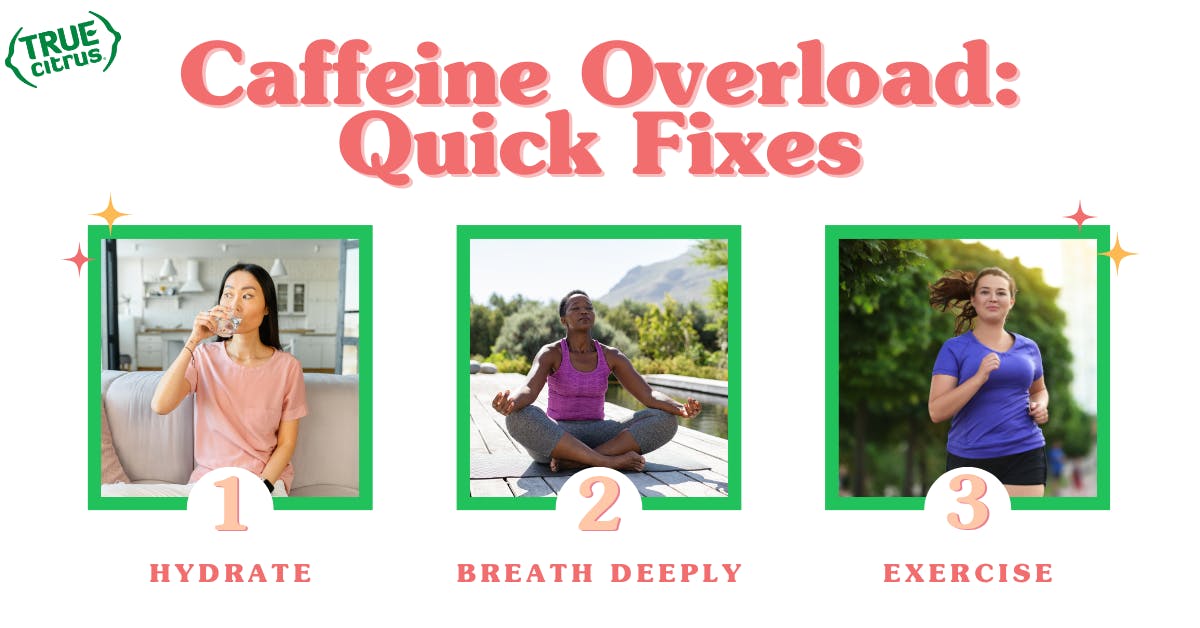
Bean There, Done That: How to Avoid the Unwanted Side Effects of Caffeine Jitters
Cut to the chase:
- How Much Caffeine Is Too Much?
- Caffeine's Effects on Your Body
- Caffeine Jitter Symptoms
- What to do if You've had too much Caffeine
- Clean Caffeine Alternatives
- Caffeine from Green Tea
Ever felt like you're bouncing off the walls after your morning cup of coffee? That's the caffeine jitters for you – a buzzing sensation that can turn your need for energy into an uneasy feeling. It's the body's way of telling you it's overwhelmed with too much caffeine. But don’t fret! Luckily, there is still a way to keep your energy up… (minus the jitters!)

How Much Caffeine Is Too Much?
Caffeine: the MVP for an early morning jolt or a midday revival, proves that, like most good things in life, balance is key. Too much, and we tip the scales from a helpful boost to potential an unwelcome jitterfest.
So, what amount of caffeine is too much?
Experts like the FDA, Mayo Clinic, and The New York Times suggest that adults should cap their caffeine intake at about 400 mg per day.
That's roughly the equivalent of four average-sized cups of coffee. But remember, not everyone's cup of coffee brews the same, so keeping an eye on those milligrams is key! It’s also important to consider caffeine sensitivity because everyone is different. Drinking on an empty stomach and body weight are a few factors that can affect what caffeine levels you can comfortably handle.
Behind the Buzz: Caffeine's Effects on Your Body
Nervous System Overload
Caffeine is like a cheerleader for your nervous system, getting it all hyped up. Caffeine makes your brain more active by blocking sleepiness signals and raising our main stress hormone: cortisol. Increased cortisol levels put your body into a flight-or-fight mode which causes your nervous system to work harder, making you feel more awake and alert, but too much can make you feel restless or shaky.
Heart Race Hustle
When you drink a lot of caffeine, it stops a calming chemical in your body called adenosine from working. This makes your blood vessels tighter and causes your body to release "alert" hormones, making your heart beat faster and harder.
Pro Tip: Dodge the afternoon slump! Wait about an hour after waking up to have your first cup of coffee. Drinking caffeine too soon can interfere with your body's natural process of clearing out the sleep-inducing adenosine. By delaying your caffeine intake, you'll avoid a surge of grogginess (from the leftover adenosine) when caffeine's effects wear off later in the day.
Long-Term Effects on Your Body
While we're all for living in the moment, a sneak peek into the future shows why moderation is key. According to The National Library of Medicine, regularly crossing the daily caffeine intake limit can invite caffeine withdrawal symptoms and other unwelcome guests like insomnia, stomach issues, and even increased blood pressure over time.

What Do Caffeine Jitters Feel Like?
Caffeine jitters are more than just feeling extra energetic. If you're wondering whether you're experiencing the adverse effects of caffeine consumption, here are the tell-tale signs from The Mayo Clinic:
- Anxiety: Feeling unusually anxious or nervous without a clear reason could be a sign. It's like your mind is in overdrive with worry.
- Shakiness: You might notice your hands or whole body shaking, which can make it tough to do things with precision or just stay still.
- Increased Heart Rate: You might notice your heart beating faster than usual as if you've been exercising, even though you haven't moved much.
- Dizziness: A sense of lightheadedness or feeling unsteady, almost as if you're momentarily losing your balance, is common.
- Insomnia: Difficulty falling asleep or staying asleep, even when you feel tired, can be a direct result of too much caffeine.
- Irritability: Minor annoyances might feel magnified, leading to a shorter temper and frustration over small issues.
- Headaches: A tight, pressing pain in your head, which can range from mild to severe, often accompanies caffeine overconsumption.
Identifying these symptoms can help you understand your body's response to caffeine and guide you towards more balanced energy levels.
Disclaimer: When experiencing the above symptoms or the negative effects of caffeine it is always best to consult your doctor.

What To Do If You've Had Too Much Caffeine
If you find yourself overcaffeinated and buzzing more than you'd like, take a deep breath! Remember, it’s a temporary feeling, and we’re here with some comforting tips to help glide you back to the chill zone.
Tip #1: Hydrate, Hydrate, Hydrate!
First up, water is your best friend. Caffeinated beverages have a way of causing dehydration. So, grab a glass (or two) of water and start sipping. Not only does it help flush out the caffeine, but it also helps calm the jittery seas. And hey, why not make it a tastier ride with a packet of True Lemon? It’s like sending a rescue boat for your taste buds while you're at it!
Tip # 2: Breath In, Breath Out
Feeling jittery can also crank up your stress levels. Here’s a secret weapon: deep breathing. By taking slow, deep breaths, you’re telling your body, “Hey, it’s okay. We got this.” It’s like hitting the pause button on a fast-forward day. Just a few minutes can make a world of difference.
Try this: Inhale deeply through your nose for a count of four, hold for a count of four, then exhale slowly through your mouth for a count of six. Repeat a few times and feel the tension melt away.
Tip #3: Move It to Lose It
Now, if you feel like you could run a marathon with all that energy, why not put it to good use? Exercise can help burn off some of that excess caffeine energy. Go for a walk, hit the gym, or have a dance party in your living room—whatever gets you moving. It's a win-win; you’re working off the jitters and getting in a healthy sweat sesh.

Clean Caffeine: Feel-Good Alternatives
Tired of the coffee jitters but still craving that morning or midday boost? Want to decrease your caffeine intake without quitting cold turkey? Enter the world of clean caffeine, a dream alternative that offers a more refined, gentle lift to your day. Clean caffeine often contains L-theanine, an amino acid that can have calming effects on the body. These caffeine sources are often characterized by a more gradual onset of energy without jitters or crashes and are derived from plants with minimal processing. Some great clean caffeine options include:
- Green Tea (and other herbal teas like chamomile, peppermint, and rooibos)
- Yerba Mate
- Matcha
- Guarana
- Chicory Coffee
- Kombucha
Switching from other caffeinated drinks to a clean caffeine source is like swapping out a bustling city street for a quiet, sunlit path in the woods.

Caffeine from Green Tea
Imagine all the clear-headed energy you need, wrapped up in a neat little packet. That’s True Lemon Energys for you. We’ve ditched the traditional caffeinated coffee jitters and swapped in green tea's smooth, steady vibe for a healthy lifestyle. Here’s the scoop on why it’s about to become your new natural stimulant:
- No Jitters: Just pure, steady energy. It’s like having your cake and eating it too but in the world of caffeine.
- No Artificial Sweeteners: We keep it real with ingredients you can actually pronounce.
- Zero & Low-Calorie Options: Yes, you heard that right. Enjoy the calorie-free lift from our products without adding to your calorie count. Most True Lemon Energys offer 0 calories and our Tropical Fruit Punch flavor keeps it low with only 10 per packet!
- Convenient Packets: Whether you're scaling mountains or just tackling your inbox, these packets are ready to go wherever you are.

Unleash Productivity with Jitter-Free Energy
Forget the complex ingredients other energy drinks and soft drinks use that sound like a chemistry exam. Our approach is straightforward and refreshing, ensuring that every packet brings an easy boost without the hard-to-pronounce ingredients.
Find your caffeine partner with our delicious selection of flavors including:
- Wild Cherry Cranberry
- Wild Blackberry Pomegranate
- Strawberry Dragonfruit
- Blueberry Acai
- Tropical Fruit Punch
Join us, and let’s make every moment as vibrant and full of life as you are. Find True Lemon Energys right here on our site, on Amazon, or in a grocery store near you.
Resources
“Caffeine: How Much Is Too Much?” Mayo Clinic, Mayo Foundation for Medical Education and Research, 19 Mar. 2022, www.mayoclinic.org/healthy-lifestyle/nutrition-and-healthy-eating/in-depth/caffeine/art-20045678.
Rivers, Autumn. “Caffeine Overdose: Symptoms, Side Effects, and Treatment.” Healthline, Healthline Media, 6 Dec. 2018, www.healthline.com/health/caffeine-overdose.
Commissioner, Office of the. “Spilling the Beans: How Much Caffeine Is Too Much?” U.S. Food and Drug Administration, FDA, www.fda.gov/consumers/consumer-updates/spilling-beans-how-much-caffeine-too-much#:~:text=For%20healthy%20adults%2C%20the%20FDA,it%20(break%20it%20down). Accessed 17 Apr. 2024.
Planning Committee for a Workshop on Potential Health Hazards Associated with Consumption of Caffeine in Food and Dietary Supplements. “Caffeine Effects on the Cardiovascular System.” Caffeine in Food and Dietary Supplements: Examining Safety: Workshop Summary., U.S. National Library of Medicine, 23 Apr. 2014, www.ncbi.nlm.nih.gov/books/NBK202224/.
A;, Klevebrant L;Frick. “Effects of Caffeine on Anxiety and Panic Attacks in Patients with Panic Disorder: A Systematic Review and Meta-Analysis.” General Hospital Psychiatry, U.S. National Library of Medicine, pubmed.ncbi.nlm.nih.gov/34871964/. Accessed 12 Apr. 2024.
Chaudhary, Ninad S, et al. “Caffeine Consumption, Insomnia, and Sleep Duration: Results from a Nationally Representative Sample.” Nutrition (Burbank, Los Angeles County, Calif.), U.S. National Library of Medicine, 2016, www.ncbi.nlm.nih.gov/pmc/articles/PMC6230475/.
